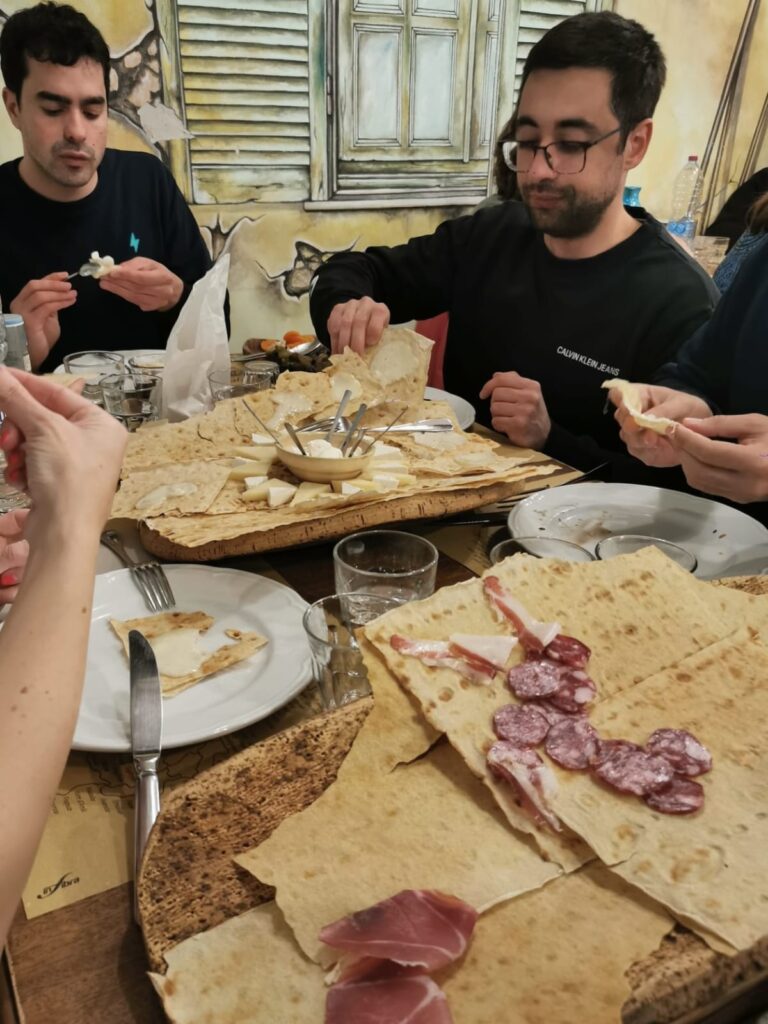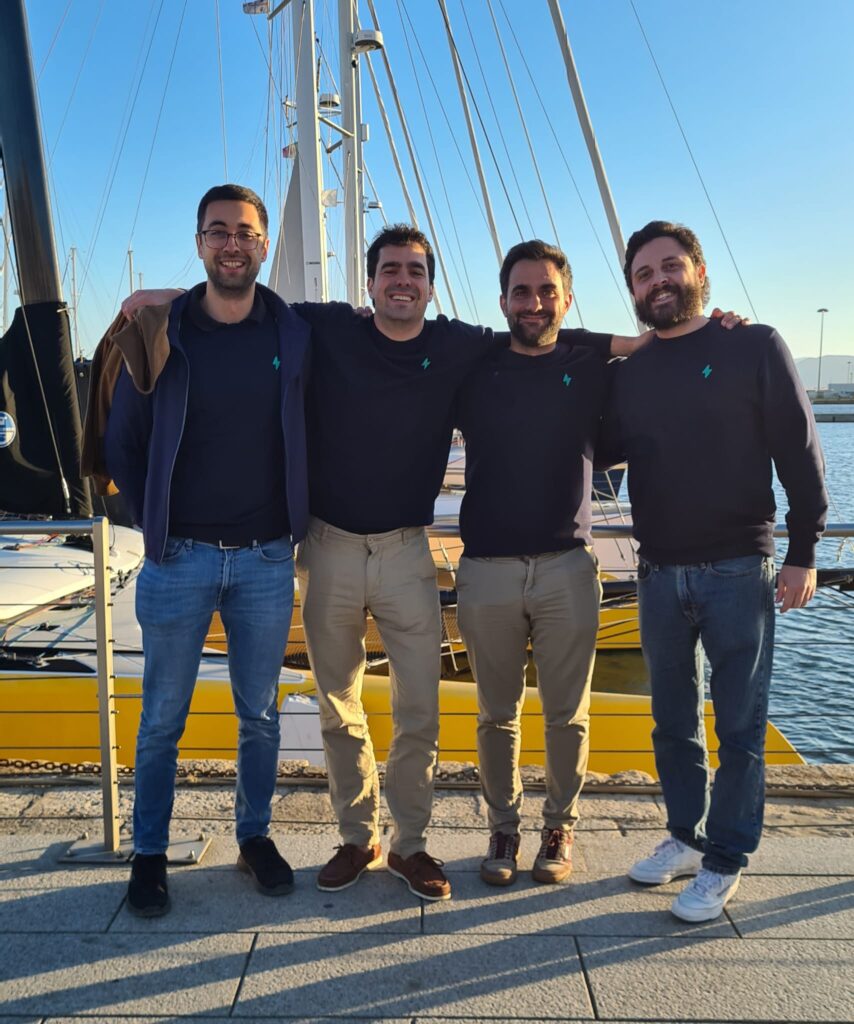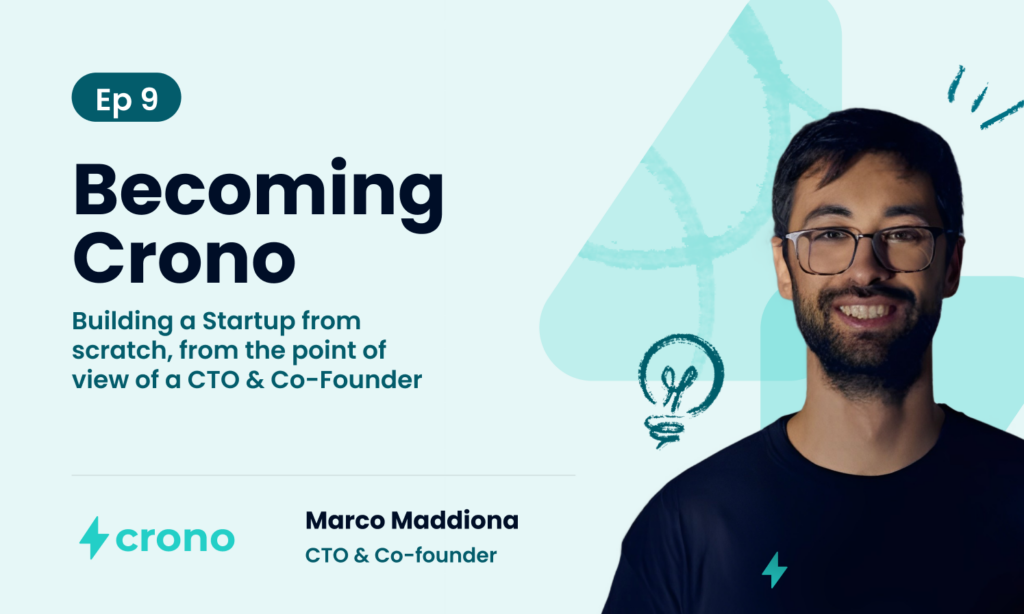Building a startup from an idea can be an exciting adventure that tests resilience, passion, and commitment. It’s about creating something entirely new and adopting the right mindset to turn it into a successful reality.
With “Becoming Crono” we’ll revisit our starting point through an honest and captivating memoir written by our CTO, Marco Maddiona.
Each month, you’ll have the opportunity to witness firsthand the steps that propelled Crono into a startup with a €500,000 pre-seed investment. This will encompass the obstacles we overcame and the choices we made. Have you ever wondered what it’s like to develop software while building a business?
If you are already on board then, enjoy our new episode of Becoming Crono!
Ep. 9 - Planning the future of a product
Hi Croners, I’m Marco Maddiona, CTO & Co-Founder of Crono, welcome back! In case you have missed the previous episodes head here to read the very start of our adventure. Now, let’s dive right into our story!
New emerging challenges
In fact, the second important problem that emerged during the beginning of the year was linked to the management of customers, especially the larger ones, who required greater dedication to ensure that the adoption of our application was supported in the best possible way.
Crono is software for the outbound sales process. Though sales might seem uniform, there are vast differences based on company type, size, sector, and people’s experience. Choosing Crono means adopting a new work setup, which could integrate well with existing processes or require some adjustment.
The Crucial Role of Customer Success
The Customer Success department handled this, requiring a dedicated full-time role to speed up the onboarding of large customers and manage diverse requests from smaller ones. Paul Graham’s article “Startup in 13 Sentences” highlighted the importance of this role for startups.
Finding the right Customer Success manager who could quickly grasp outbound sales logic, understand Crono, and exhibit patience, availability, and proactivity towards customers was challenging. After some unsuccessful hires, we were cautious but needed to move fast to find motivated people willing to learn and get involved.
Moreover, after our previous unsuccessful experiences with some employees, we were a bit burned by the search for new figures (developers, sales and customer success). We knew we needed to move fast, but we didn’t want to just fill in the missing boxes, we wanted to find people who were as motivated as all the other team members and, even if young, who were willing to learn and get involved.
New trends: the AI SDRs wave
Startup life demanded high work rates, but with a lean structure and well-distributed responsibilities, the rewards were much higher than in other work environments. We conducted interviews for weeks while focusing intensely on product development and marketing, bolstered by a new addition to the sales team.
Meanwhile, competitors were active, and two new trends emerged:
- AI SDRs, aiming to replace human salespeople with virtual agents sending messages at scale.
- Data enrichment platforms, aggregating data sources to provide info on potential leads.
Software hype was common, especially around promising innovations. AI accelerated the introduction of innovative features, now readily accessible to developers as off-the-shelf services.

We took time to observe these trends. Were they just hype, or truly effective? What benefits did they bring users? We knew Crono was also innovating outbound sales software and had already introduced many of these trending features to some extent.
The Need for a Well-Defined Identity
Unlike other emerging software, however, in terms of communication and consequently user experience, Crono did not claim to belong to a well-defined category, causing confusion for potential customers who approached us for the first time.
“Ah, you also do automation, so you are an AI SDR?”
“Uhm… no, we believed in the importance of the human salesperson.” “
I see that with your tool I could also create contact lists, were you a Data Enrichment platform?”
“Yes, but we didn’t just do that.”
“What were you then?”
“We were Crono!”
At that time, we realized that this type of conversation no longer had much effectiveness and that we necessarily had to find something that would allow us to give ourselves a well-defined identity that was easily understandable to the end user.
In short, there was an urgent need for a brainstorming period among co-founders to share our analyses of what we were finding and to define the next steps needed to improve our proposition. To do this, what could be better than a week-long retreat in one of the most beautiful regions of Italy?
Refreshing our identity in Cagliari
We decided to take a flight to Cagliari, to be able to work together side by side and foster reciprocal influence in order to share a common development direction.
Working remotely in different cities could give you many advantages, but it was undeniable that communication, alignment and the flourishing of new ideas improved drastically when everyone was in the same room.
Moreover, we discovered that Cagliari was a very active city in the digital field: we had the opportunity to work in two different co-working spaces (The Net Value and Opificio Innova) and to meet many people and high-level realities. Above all, we had fallen in love with the hospitality of the Sardinians who had invited us and welcomed us into their offices and taken us to learn about so many beautiful things in this city.

Even if it wasn’t easy to believe, we didn’t just eat during those days.
We had the opportunity to better understand the difficulties and feelings that each of us was encountering daily in our own area of expertise. What did investors think of our value proposition? What did potential customers perceive? What were we finding from user usage and what difficulties did they have?
New trends in the market
As I mentioned earlier, when everyone works in the same room, a different connection is created compared to working remotely. By analyzing the new emerging trends, but trying to maintain the idea of software that we had always wanted to achieve, we managed to outline which direction to take both in terms of communication and development for the Q2 and Q3 period (second and third quarters of 2024).
These were the key points that emerged following that week:
- Favouring a faster and richer approach to generating contact list information (winking a bit at data enrichment tools). To achieve this, we would necessarily have to work much more on integration with external providers and on the quality of the data we obtained from them.
- Increasing automation, both on operational and decision-making aspects, provides these features as an extension of the individual user’s capabilities, not as a replacement. We made this choice because we understood the advantages of AI SDR tools, but we were convinced that the salesperson should be supported in their process by artificial intelligence but not replaced.
- Improving personalization features thanks to generative AI and data availability. We had always been convinced that a precision approach to outbound sales, even on a small scale, was much more effective than a massive and generalized approach. Crono had to support the sales department in this process and make it as effective as possible.
At the end of those brainstorming sessions (and an intense week of work), we felt we had the right recipe in hand and had begun to outline the operational plan to put it in place over the next few months.
We enjoyed the last weekend of spring in Sardinia, trying to recuperate some energy for the next rush that awaited us.

Changes are for the braves
Returning to base, we continued to work head down while resuming the active search for new Croners to fill the missing roles.
As initial feedback, we realized that the new value proposition was starting to attract more interest from investors and potential customers.
For a startup, it’s important to keep evolving from all perspectives. To connect the dots with the initial part of this post, why is the Customer Success role so important?
Because it allows for direct feedback from users and, by trying to interpret their level of satisfaction, one can understand what’s missing and how the proposed service should solve their problems.
It’s therefore important to have a clear idea of where you want to end up as a final result, but it’s essential to be ready to analyze new trends, understand customer needs, and be quick to iterate on communication, especially on the product.
Changing at the communication level is obviously faster than changing the product. New features take time to be designed and implemented, and as much as a startup tries to work in a lean way, dividing the work into sprints, it takes a few weeks to start seeing the first results of these new developments.
This leads to a disconnection between the sales/marketing department and the product, especially in terms of results. After making the decision on the new value proposition, customers don’t immediately find the feedback of these changes within the software, implying an inevitable slowdown in sales.
It’s difficult to explain to a potential customer the concept of “we’re working on this thing”. Or rather, the customer understands it very well, but if they have a need to solve at that moment, their answer will be: “Okay, I’ll come back in 2 months”.
During this period, doubts may emerge about having chosen the right direction, which can push one to change the value proposition again, even before having put it in place.
How to drive change as a CTO
At that moment, however, it’s necessary to firmly hold the direction taken. As CTO, I insisted on giving the development team time to put the established changes in place before thinking about any new changes.
The reason is simple: the chosen direction was the result of an objective analysis of technological trends and user feedback, but to understand if it’s the right path, it first needs to be put in place, in the shortest possible time, and the user feedback needs to be analyzed (“Build, measure, learn” from The Lean Startup – Eric Ries).
In short, one has to suffer a little, try to work quickly, leave aside non-priority things, and focus all the resources of the development team to bring these new features into production as soon as possible.
Consequently, April and May turned out to be months below expectations in terms of results, but we were finally ready for the beginning of June. The new features were immediately well appreciated, and the new workflow drastically improved user performance and the perception of new customers.
This made us realize that we had taken the right path, on which we had to continue to build.
In June, we also managed to complete the team with two new developers (welcome Dima and Nicu) and a customer success manager (welcome Lollo) who immediately integrated greatly into the team and demonstrated that they had the DNA of true Croners.
To conclude, June 2024 ended as the new best month (so far) in terms of turnover, confirming the excellent work we were doing and the continuous improvement of our solution.
Keep reading our blog for more exciting stories!
